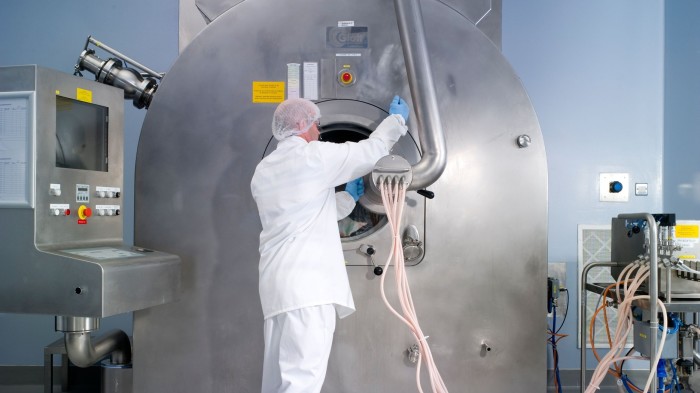Stay informed with free updates
Simply sign up to the Pharmaceuticals sector myFT Digest — delivered directly to your inbox.
The US imported a record $53bn of products used in the pharmaceuticals and medical industry in March as companies rushed to build stockpiles in case Donald Trump hits the sector with tariffs.
Imports of pharma products soared around 160 per cent in March from the same month the previous year, and almost doubled from February, reaching the highest on Census Bureau records stretching back to 2002.
The rush to purchase finished products and ingredients that are used to make them is one of the earliest signs of how Trump’s sweeping tariffs on US trading partners are reshaping global business.
Trump has not yet announced levies targeting the pharmaceuticals sector, but companies are preparing for the possibility they might be imposed after the US last month launched a national security review on the subject.
The US president on Monday promised to make European countries pay more for drugs, while calling on pharmaceutical companies to lower prices for US consumers. A White House official noted, however, that tariffs on pharma products were a “separate” matter.

The US and UK said last week they would promptly negotiate “significantly preferential” tariff treatments on drugs and ingredients. The pledge would be contingent on the outcome of Washington’s pharmaceuticals sector probe and UK compliance with supply chain security requirements.
Ireland accounted for $28bn of the imports in March, up from $5.5bn in the same period the previous year. Several US pharmaceutical companies have manufacturing sites in Ireland — lured in part by Dublin’s relatively low corporate tax rate. The country, which is the third-largest exporter of pharmaceuticals globally, has approximately 50 US Food and Drug Administration-approved pharma and biopharma plants.
JPMorgan Chase’s Abiel Reinhart said branded drug developers “will be able to use the import stockpile they are building now to cushion the impact of tariffs while they build out US manufacturing”.
Cuts to US corporate tax rates during the previous Trump administration reduced some of the incentive to manufacture in Europe, he said, but added that “the volume of production in Europe is still high owing to past investments”.
A number of US pharmaceutical groups have recently made announcements about expanding domestic manufacturing. These include Eli Lilly, which in February set out plans for $27bn of investment, while Johnson & Johnson said in March that it would invest more than $55bn in four factories.
On a quarterly earnings call this month, Lilly’s chief executive told investors that “upon completion” of the company’s manufacturing plan, it “will be able to supply medicines for the US market entirely from US facilities, as well as increase the volume of medicines we export”.
Other US pharmaceutical companies have stressed that they already have a strong domestic manufacturing presence, and that they have set up processes to respond to volatile trade policy.
Biogen, a large biotech group, said in its first-quarter results that it “operates a significant manufacturing presence in the US”, while Pfizer’s chief financial officer told analysts that the company had set up a “cross-functional team” to analyse potential outcomes in the current “fluid environment”.
Merck chief executive Rob Davis told analysts that while the company’s “biggest exposure” for tariffs was its blockbuster cancer drug Keytruda, it had inventory in the US to last all of 2025.
Recommended
Industry figures have warned on the impact of pharmaceutical tariffs, including the chief executive of Johnson and Johnson who said that they could lead to drug shortages.
The US currently has no tariffs on many pharmaceuticals because of a 1994 World Trade Organization trade deal.
European pharmaceuticals companies are also boosting their US investments in response to the tariff threats. AstraZeneca said this month it was planning further investment in addition to its 11 US production sites, including shifting manufacture of Europe-made products to the country.
UK-listed GSK is planning tens of billions of dollars of investment in manufacturing and research and development in the US over the next five years.
Additional reporting by Jude Webber in Dublin



